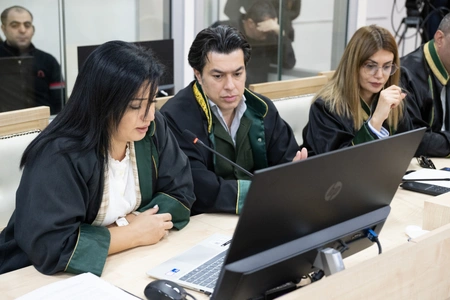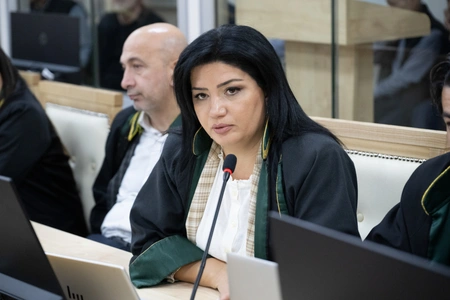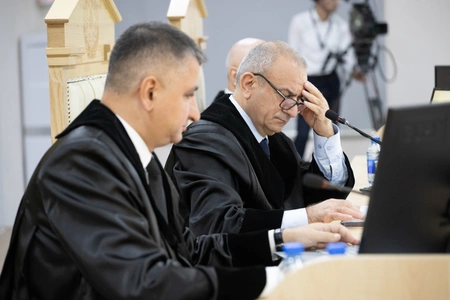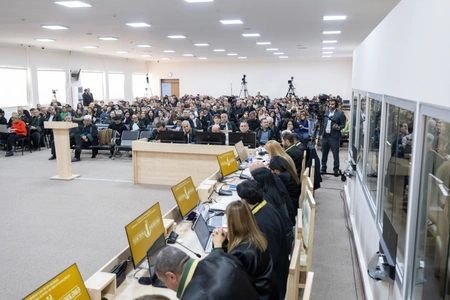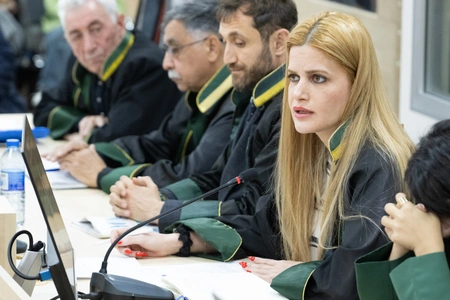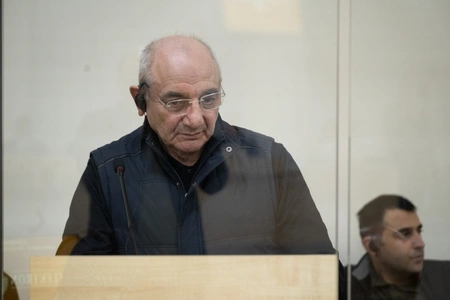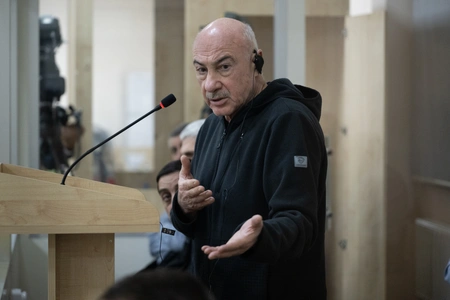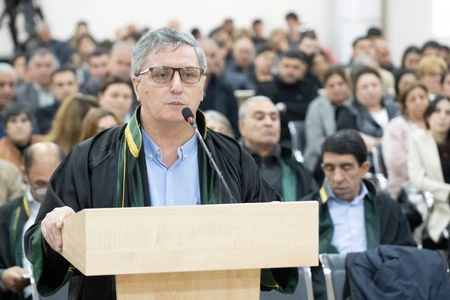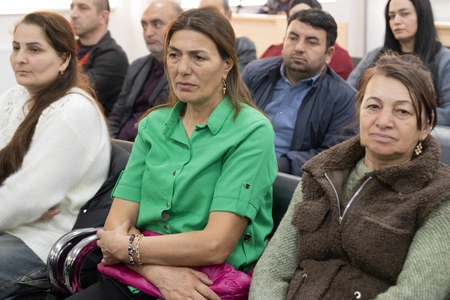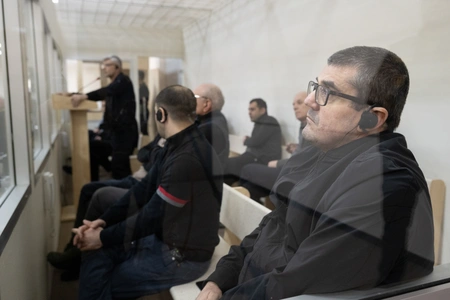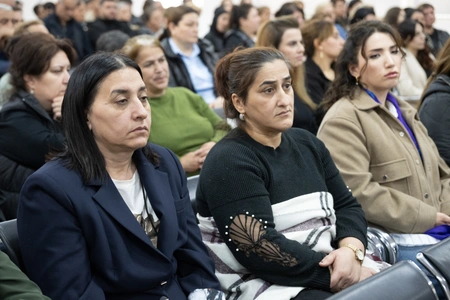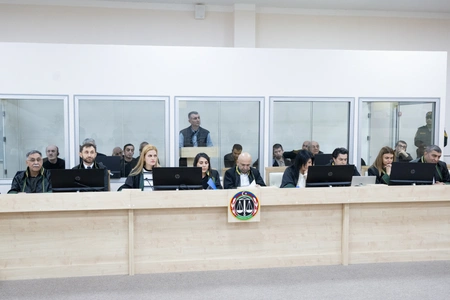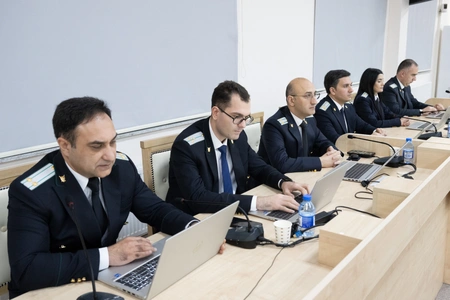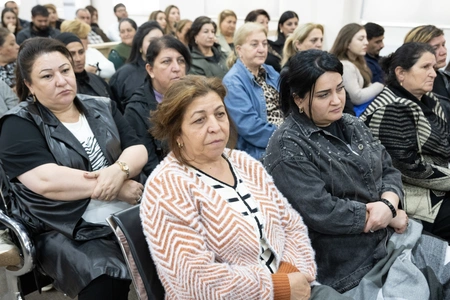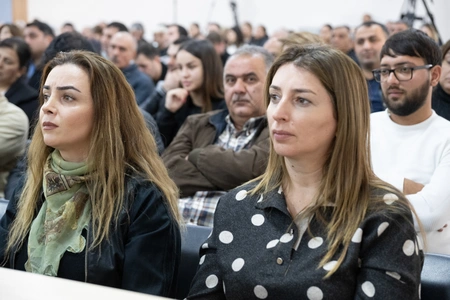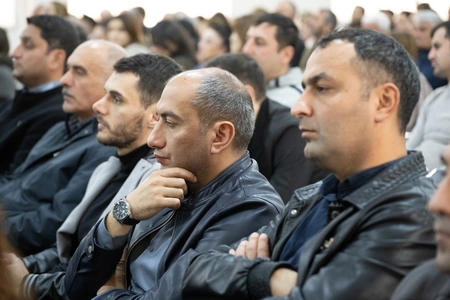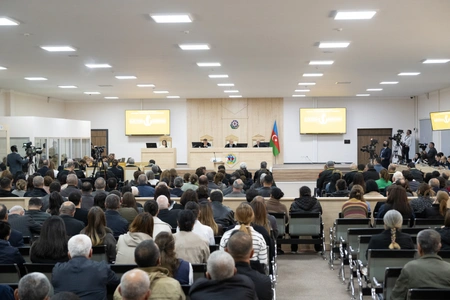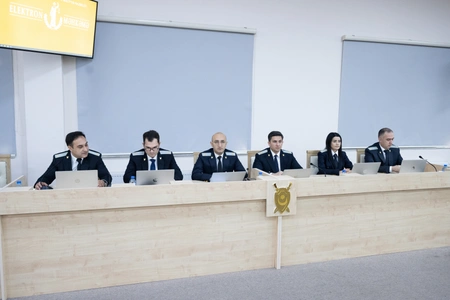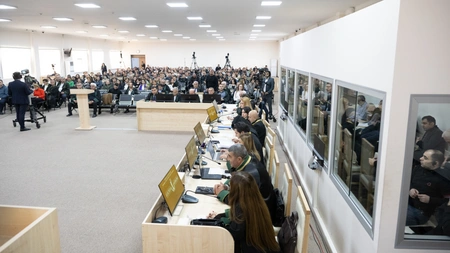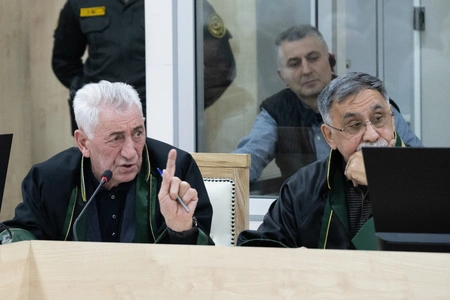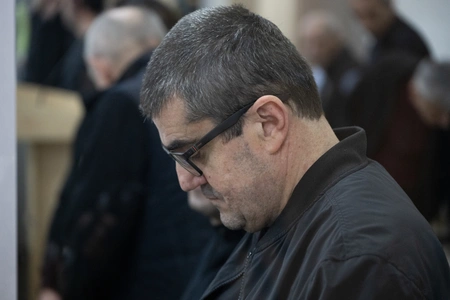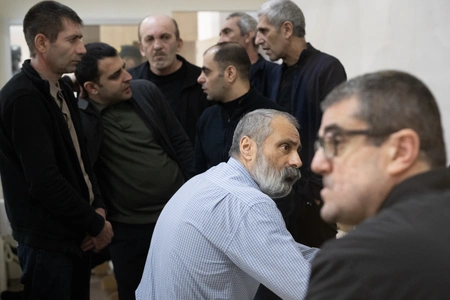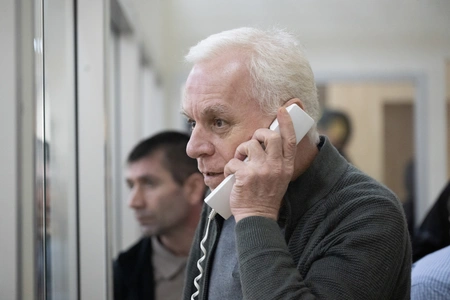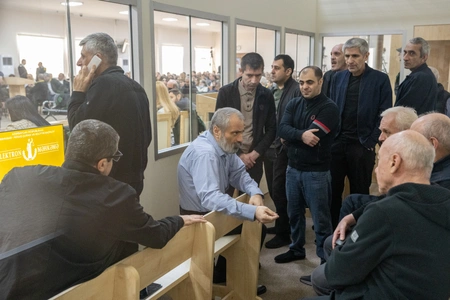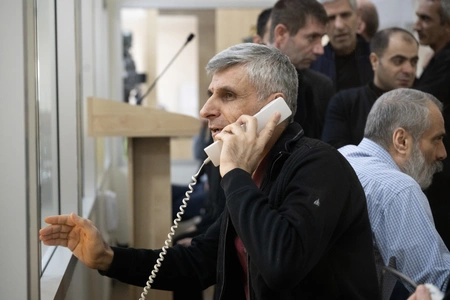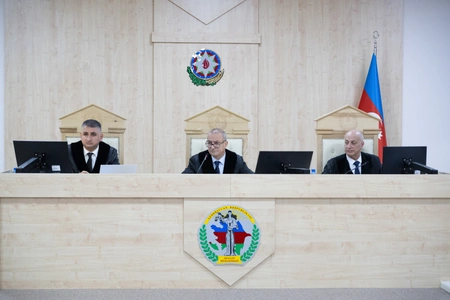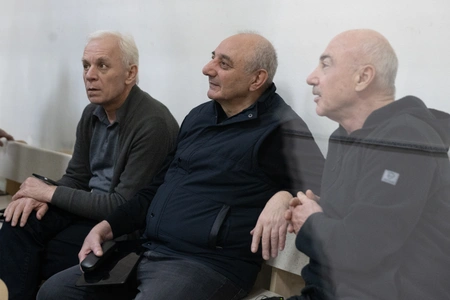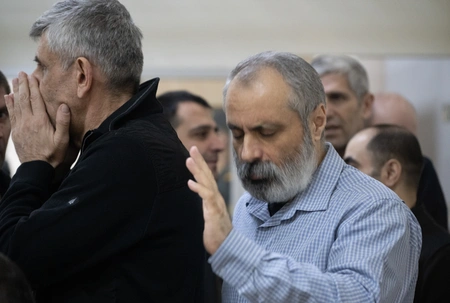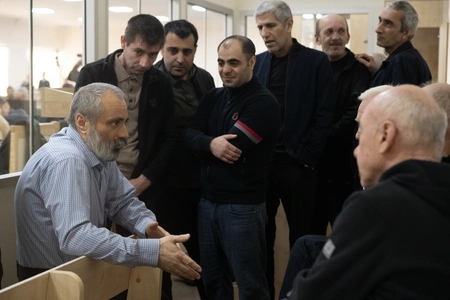Court interrogation of Armenian citizens concluded as prosecutors request time from judge to prepare speeches
- 01 November, 2025
- 08:54
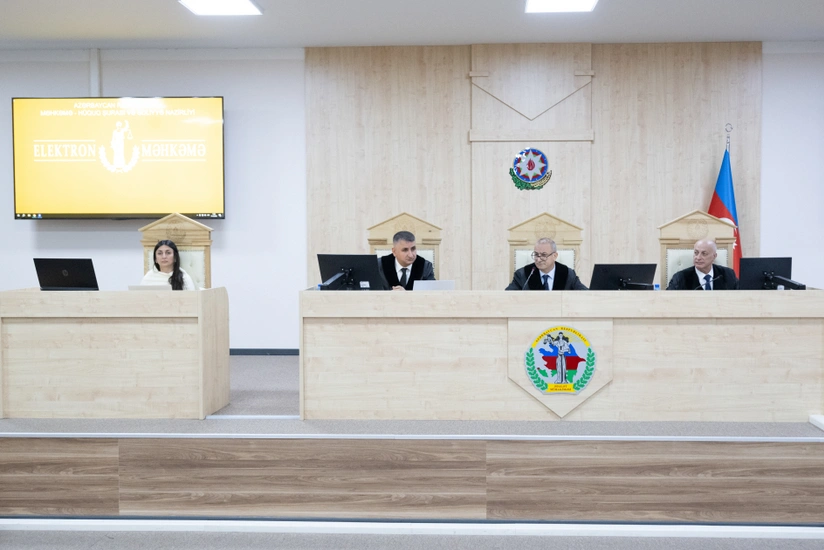
The open court hearing on the criminal cases against citizens of the Republic of Armenia - Arayik Harutyunyan, Arkadi Ghukasyan, Bako Sahakyan, Davit Ishkhanyan, David Babayan, Levon Mnatsakanyan, and others - accused of committing crimes against peace and humanity, war crimes, including the preparation and conduct of an aggressive war, genocide, violations of the laws and customs of war, as well as terrorism, financing of terrorism, violent seizure and retention of power, and numerous other offenses resulting from Armenia"s military aggression against Azerbaijan, continued on October 31.
Report informs via AZERTAC that the trial was held at the Baku Military Court under the chairmanship of Judge Zeynal Agayev, with Judges Jamal Ramazanov and Anar Rzayev (reserve judge Gunel Samedova) participating in the panel. Each defendant was provided with an interpreter in their preferred language and legal counsel for their defense.
The hearing was attended by the defendants, their lawyers, some of the victims, their legal successors and representatives, as well as prosecutors representing the state prosecution.
At the beginning of the session, the defense lawyer of the accused Levon Mnatsakanyan, Ogtay Madatov, addressed the court, requesting a meeting with his client during the break. The judge stated that appropriate conditions would be provided for this during the recess.
Defendant David Manukyan then filed a motion, stating that he did not agree with certain aspects of the charges brought against him. He requested that the accusation related to the creation of a criminal organization be removed from the parts of the criminal case concerning him, and that his case be separated into a distinct proceeding.
Manukyan"s defense lawyer supported the motion.
State prosecutor Fuad Musayev, commenting on the motion, noted that the current stage of the proceedings is not the phase for evaluating evidence, and that the issue raised by the defense pertains to that later stage. The prosecution stated that it would present its position on the matter after the completion of the judicial investigation, during the final statements, and reminded that the court would assess the evidence in the deliberation room.
After hearing the representatives of the victims, the court ruled that the motion was unfounded and rejected it.
Subsequently, the defense lawyer of the accused Madat Babayan, Leyla Namazzade, filed a motion requesting that certain episodes of the charges against her client be removed. The defendant agreed with the motion filed by his lawyer.
Prosecutor Taranah Mammadova stated that the issues raised in the motion were not relevant to the current stage of the trial and would be evaluated by the court during its deliberations. The court announced that the matters mentioned in the motion would be considered in the deliberation room and therefore left the motion unexamined.
Defendant Bako Sahakyan answered questions from his lawyer regarding the evidence he had submitted at the previous hearing.
Later, the defense lawyer of Levon Mnatsakanyan informed the court that, during his meeting with his client, the latter had provided several documents from his personal archive to be added to the case file, and presented them to the court.
The lawyer of defendant Levon Balayan, Saqi Mammadov, also requested a confidential meeting with his client. Judge Zeynal Agayev stated that the necessary conditions would be provided for this during the break.
At the end of the hearing, the presiding judge inquired about the parties" opinions regarding the conclusion of the judicial investigation. None of the parties objected to the completion of this stage.
Vusal Aliyev, Senior Assistant to the Prosecutor General, noted that the prosecution was satisfied with the evidence presented during the trial.
The presiding judge declared the judicial investigation phase closed and reminded the participants that during the final statements, the parties may refer only to the evidence examined in court.
The prosecutors requested time until November 3 to prepare their closing statements. It was decided that the next hearing would begin with the parties" closing arguments.
The trial will continue on November 3.
Fifteen defendants of Armenian origin are accused in the criminal case concerning numerous crimes committed during the aggressive war waged by the Armenian state - including the aforementioned criminal association - on the territory of Azerbaijan, in violation of domestic and international legal norms. These crimes were committed for the purpose of military aggression against Azerbaijan and were carried out under the direct leadership and participation of the Armenian state, officials of its state institutions, its armed forces, and illegal armed formations, through their written and verbal orders, instructions, and guidelines; material, technical, and personnel support; centralized management; as well as under strict control and under the leadership and direct or indirect participation of Robert Sedraki Kocharyan, Serzh Azati Sargsyan, Vazgen Mikaeli Manukyan, Vazgen Zaveni Sargsyan, Samvel Andraniki Babayan, Vitali Mikaeli Balasanyan, Zori Hayki Balayan, Seyran Musheghi Ohanyan, Arshavir Surenovich Garamyan, Monte Charles Melkonyan, and others.
The following individuals - Arayik Vladimiri Harutyunyan, Arkadi Arshaviri Ghukasyan, Bako Sahaki Sahakyan, Davit Rubeni Ishkhanyan, David Azatini Manukyan, Davit Klimi Babayan, Levon Henrikovich Mnatsakanyan, Vasili Ivani Beglaryan, Erik Roberti Ghazaryan, Davit Nelsoni Allahverdiyan, Gurgen Homeri Stepanyan, Levon Romiki Balayan, Madat Arakelovich Babayan, Garik Grigori Martirosyan, and Melikset Vladimiri Pashayan - are being charged under the following articles of the Criminal Code of the Republic of Azerbaijan: Article 100 (planning, preparing, initiating, and waging a war of aggression); Article 102 (attacking persons or organizations enjoying international protection); Article 103 (genocide); Article 105 (extermination of the population); Article 106 (enslavement); Article 107 (deportation or forced displacement of population); Article 109 (persecution); Article 110 (enforced disappearance of persons); Article 112 (deprivation of liberty contrary to international law); Article 113 (torture); Article 114 (mercenary service); Article 115 (violation of the laws and customs of warfare); Article 116 (violation of international humanitarian law during armed conflict); Article 118 (military robbery); Article 120 (intentional murder); Article 192 (illegal entrepreneurship); Article 214 (terrorism); Article 214-1 (financing terrorism); Article 218 (creation of a criminal organization); Article 228 (illegal acquisition, transfer, sale, storage, transportation, and possession of weapons, ammunition, explosives, and devices); Article 270-1 (acts threatening aviation security); Article 277 (assassination of a state official or public figure); Article 278 (forcible seizure and retention of power, forcible change of the constitutional structure of the state); Article 279 (creation of armed groups not provided for by law); and additional articles.
